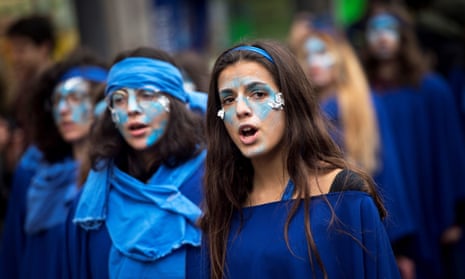World leaders are meeting in Spain to decide whether or not to bother with preventing the destruction of the earth, like people in a vehicle speeding toward a cliff deciding whether to brake or swerve or just chat about other things. Powerful senior citizens in the United States – Trump, Giuliani, Biden – are trading playground insults, and the middle-aged people who make a lot of decisions about how to handle this emergency seem incapable of thinking beyond the singularly imagination-killing criterion of short-term profit.
I began writing this column at a Youth v Apocalypse demonstration in San Francisco. The protest, which was led by teens, of course, as well as some of the 20-something members of the Sunrise Movement and Extinction Rebellion, took place in front of Black Rock, the world’s largest investor in fossil fuels. There was a little cluster of mothers at the demonstration too, with babies and toddlers whose life expectancy, barring catastrophes, extends into the 22nd century. It was a Fridays for Future demonstration taking place all over the world, with half a million mostly young people in Madrid.
Sometimes I think that our species was for most of its history a child: it had limited capacity to harm and thus limited responsibility to do no harm. We could kill each other, but we did it without napalm and nuclear weapons that kill a lot of other things. We could think small because we acted small, mostly; we were altering the earth with hunting, grazing, farming, foraging, building, but most of our traces would vanish and most of our impact left no lasting damage.
With the industrial revolution and its reliance on fossil fuels and with technologies capable of changing the earth on a more profound scale, childhood harmlessness faded into the past for those who wielded those powers and used those tools and benefitted from it all. Humans ceased to be human-scale, but our imaginations and ethics lagged behind our impact. We have for two centuries been in a sort of wild adolescence, too reckless and impatient to pay attention to consequences or to listen to the Rachel Carsons and Vandana Shivas when they point out that there are consequences. Because, really, environmentalism has been to no small degree about shouting “don’t break that” and “clean up your room” at corporations and governments.
We are on the brink, and part of what that brink is, I believe, is the necessary end of that adolescence. As a species we must act with restraint in the face of consequences, must consider the other species with us now, those of our own not yet born, and those currently facing ultimate climate vulnerability around the world from floods, fire, sea level rise, crop failure, superstorms and more.
We must expand our imaginations and act on that bigger understanding of our place in the world and our impact on the future. That means making radical changes, like our homes and transit being powered by renewables, our government not plotting more extractivism. It means leaving fossil fuels in the ground, where they belong. We need to remind ourselves why these changes are necessary: that the earth is finite, that actions have consequences, that they go beyond the horizon of what we can see and hear, in time and space, that those who come after us have rights we can’t just annihilate. We must make sweeping changes by the end of the coming decade, and we must stick to them afterward by remembering why they matter.
What is striking in this moment is that such maturity is largely the property of the young. Many of the significant grownups in the room of climate chaos are 16 or 20 or 27, Greta and the thousands of youths like her who are less visible but no less committed, the teens from Nigeria to Alaska doing their utmost for the climate. But because they are truly young, they control no shares, have no votes, sit on no boards: they need us as we need them. They are the leadership in this moment, the people who are thinking about 2100, the people who are ready to change everything, the people who understand the gravity and scale of the catastrophe.
They are the people who have never experienced a below-average temperature on Earth, who have the capacity to recognise we are in an emergency. There is wisdom in youth, in its lack of attachment to the status quo that is not their status quo, and in its ability to imagine profound change.
There have been farsighted altruistic people in every generation, but there are signs of a wider evolution of imagination that is taking place among the young. We see that profound change in new ways of dealing with conflict, with rejecting competition and capitalism, new understandings of what is possible and ethical. We see the children are mature and too many old people are juvenile (though bless Jane Fonda at 81 for her #FireDrillFriday protests). Juvenility and maturity are no longer categories attached to how long you’ve been on Earth, but how far you see and how much you care.
Rebecca Solnit is a Guardian US columnist

